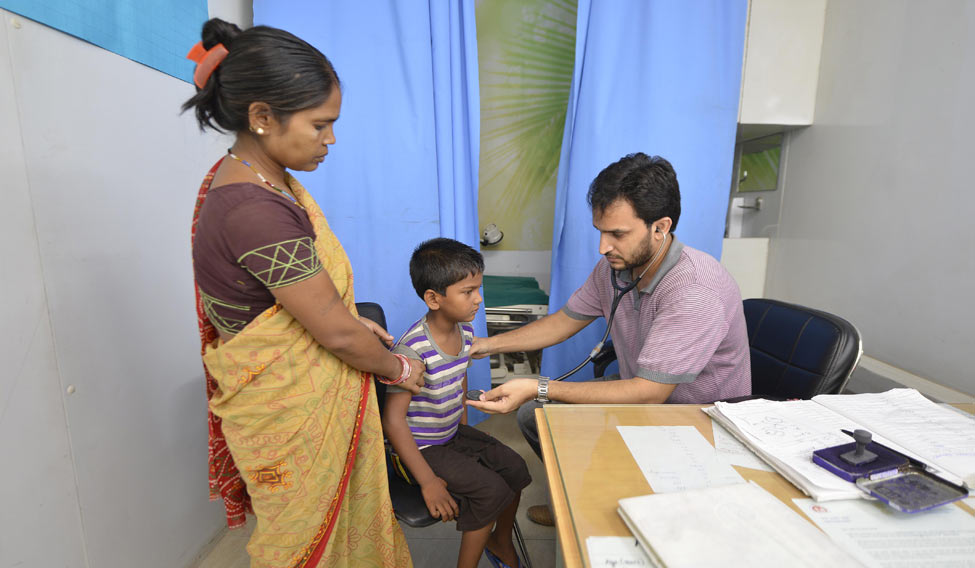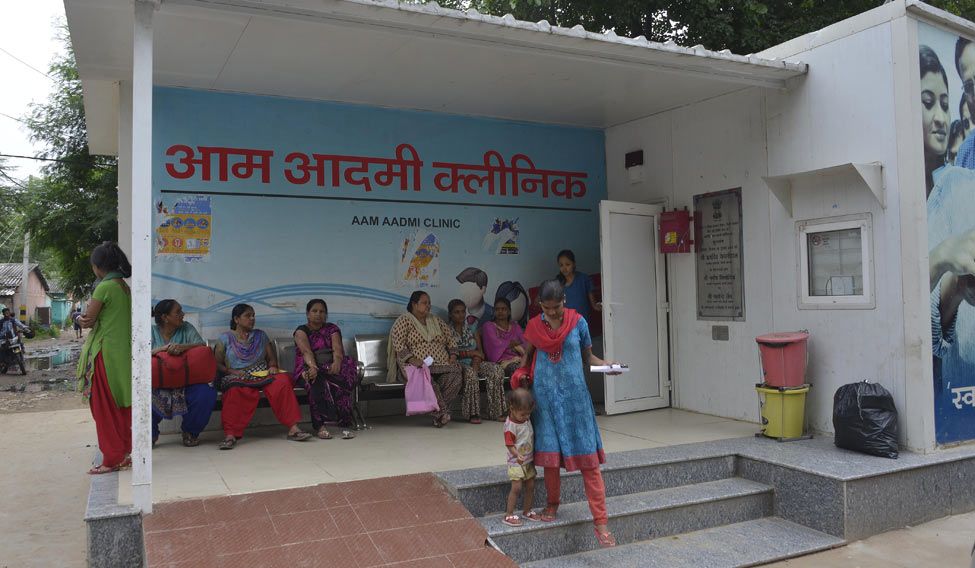It is 7:30am, and people in the relief camp in Peera Garhi, Delhi, form a queue outside the mohalla (community) clinic. The steel bench outside the entrance can seat only a few people. Inside the spick-and-span clinic, in the right corner, sits Bhawna, who takes care of the pharmacy. Medicines—tablets as well as syrups—are neatly arranged on the white table and on the glass shelves on the wall behind her. The stock of medicines—antibiotics, antipyretics, cough syrups, antacids and the like—is refilled every week.
The mohalla clinics, one of the flagship programmes of the Aam Aadmi Party government, cater to the primary health care needs of the local population. They offer free health care services and are meant to reduce the load on the secondary and tertiary hospitals of the area. There are about 100 mohalla clinics across Delhi, and the government will open 1,000 by the end of this year. The clinics usually open at 8am, close at 2pm and, according to AAP data, have treated about 8 lakh people till July 31.
Chief Minister Arvind Kejriwal inaugurated the Peera Garhi clinic—the first mohalla clinic—on July 19, 2015. More than a year later, the clinic is still buzzing with activity.
In the left corner of the clinic, lab technician Uday Raj checks blood sugar levels of patients due for their diabetic medicine. He does a number of serological tests and his equipment is stacked in a small black suitcase. In the adjacent room is Dr Basit Nazir, a medical graduate from Jammu and Kashmir, and Birmati Devi, an auxiliary nurse midwife. Nazir sees the patients; Devi vaccinates babies.
The mohalla clinics have a smart tablet, which performs over 100 medical tests, including blood sugar and heart rate. The clinics also test diseases such as malaria, dengue and hepatitis.
 Dr Basit Nazir examines a child at the clinic | Arvind Jain
Dr Basit Nazir examines a child at the clinic | Arvind Jain
The clinic is air conditioned and the ambience is better than that at other government dispensaries. However, at times, there are more than 300 patients a day.
While administering vaccination, Devi tells young mothers about contraception, the nutrition of their babies and the importance of hygiene. “In this area, men do not work,” she says. “All of them are drunkards. Women earn a livelihood by day and are beaten up by their husbands and in-laws in the evening. These women leave their children with their mothers in unhygienic conditions. Diarrhoea in children and diabetes in the elderly are the major problems here.”
Filth pervades the area outside the clinic. The colony, a collection of narrow lanes and bylanes, has kuccha houses with tin roofs. Outside each house, there are used utensils with flies hovering over them. There are open drains and large pools of water everywhere, which are breeding grounds of mosquitoes.
In the lane near the clinic lives Soni, a housemaid, who does not get enough time to take care of her nine-month-old son. Her sister, 10, takes care of him. “My son keeps falling ill,” says Soni. “My husband is drunk the whole day. The clinic makes it easier for me to take care of my son’s vaccination and health. On days I can’t go to the clinic, my sister can take him to the doctor.”
The mohalla clinic has also helped the elderly, with the doctor taking care of problems such as arthritis, diabetes and hypertension. “I am diabetic and the doctor has asked me to check my blood sugar every two days,” says Neemrat Devi. “Where else can I go for such tests? It is easy and painless.”
When the mohalla clinic was set up last year, Birmati, along with the doctor on duty at the time, Dr Alka Choudhary, went door to door to tell people about the new neighbourhood clinic. They first reached out to women from underprivileged families, who usually neglect their health. For children, they relied on an accredited social health activist.
“I feel there is greater need for an awareness programme on disease prevention in this area,” says Nazir. “Diabetes and hypertension are rampant here. Alcoholism is another major problem with almost every family of the locality.”
As we talk, a man in his forties enters the clinic and sits on the floor. “He does it daily after consuming alcohol. He is a diabetic and no counselling helps him,” says Nazir, before asking the man to come over. The man complains of overall body ache, especially his stomach. He leaves after Nazir gives him an ointment and an antacid.
“At times, people come with domestic issues here,” says Nazir. “They don’t want to go to the police station and want us to resolve the problem. It needs a lot of patience to deal with such problems. And, at times, we face medical emergencies which can be dealt with only at a tertiary care centre. We need to participate actively. We generally help them by calling an ambulance and stabilising the patient. But, at times, the family insists that it should be taken care of only by us. These are tricky situations.”
The response to these mohalla clinics has been good and other state governments, too, are looking to adopt the model. The AAP, in fact, launched the first mohalla clinic in Mumbai, in Kurla West, on August 21.








